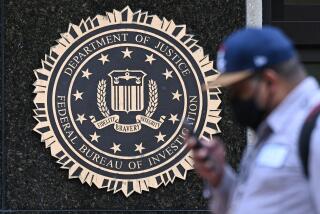FBI Knew Agents Directed Presser, Documents Claim
- Share via
CLEVELAND — A senior official at FBI headquarters in Washington concluded five years ago that Teamsters Union President Jackie Presser had placed at least one Mafia-connected employee on the Teamster payroll at the direction of FBI agents, federal court records showed Monday.
The sworn statement of James E. Moody, then chief of the FBI’s labor racketeering unit, was contained in court papers filed by Presser’s defense attorney, John R. Climaco. Moody now is assistant special agent in charge of the Los Angeles office.
Climaco filed the documents to support the lengthy motion in which he asked a federal judge to dismiss labor racketeering charges against Presser on grounds that the union chief lacked criminal intent. Presser’s trial--postponed three times--is scheduled to begin July 12.
‘Ghost Employees’
Although motions for dismissal of an indictment are rarely granted, Climaco’s filing served to outline the principal arguments that he will present at Presser’s trial. He said that Presser, who is accused of misappropriating $700,000 to place several non-working “ghost employees” on the union payroll, did not possess criminal intent because he was acting at the “direction and authority” of FBI agents.
As a secret informant for the FBI on organized crime matters from 1973 to 1983, Presser reported regularly to agents Martin P. McCann, Patrick Foran and Robert Friedrick, Climaco said in his motion.
“It is abundantly clear that an FBI agent has the authority to authorize an individual to engage in criminal content,” Climaco said, including the hiring of ghost employees.
Maintaining Contacts
The attorney also submitted sworn affidavits from McCann and Foran in which the two men, as reported previously by The Times, said they had encouraged Presser to keep certain ghost employees on the payroll as a method of maintaining his contacts with the mob.
The court papers disclosed that Moody had told an FBI inspection team in July, 1985, that “based upon my review of the FBI files (in 1983), I suspected that (convicted Cleveland gambler) George Argie had been placed on Teamsters Local 507’s payroll at the direction of the FBI.”
“This was confirmed to me by Supervisor Friedrick,” Moody added. He said he subsequently asked Friedrick to prepare a report to this effect for FBI files, which was dated Nov. 7, 1983.
Indictment Delayed
The Justice Department delayed an indictment of Presser in 1985 to determine if FBI agents indeed had authorized alleged criminal conduct by the labor leader. But the indictment was issued a year later after prosecutors concluded that some agents had lied to protect Presser as a valued informant.
To date, however, only one agent--Friedrick--has been indicted for lying, and most of the evidence against him was thrown out by a federal judge in December, 1986, on grounds that prosecutors did not properly advise him of his right to remain silent and to hire an attorney.
Friedrick has been fired by the FBI, and the Justice Department is appealing the judge’s dismissal of evidence.
Presser ‘Terrified’
Moody, in an excerpt of previously secret grand jury testimony that Climaco attached to his motion, explained that Presser and co-defendant Tony Hughes, another FBI informant who was a Teamster business agent, “were terrified” when a list of government informants was stolen from the Cleveland FBI office several years ago and provided to underworld figures.
To learn whether their lives were in jeopardy, Presser and Hughes were authorized by FBI agents to hire Argie, a professional gambler who had good connections with the Mafia, Moody testified.
Justice Department prosecutors declined immediate comment on Climaco’s filing. The department has 14 days to file a response with U.S. District Judge George W. White.
More to Read
Sign up for Essential California
The most important California stories and recommendations in your inbox every morning.
You may occasionally receive promotional content from the Los Angeles Times.













